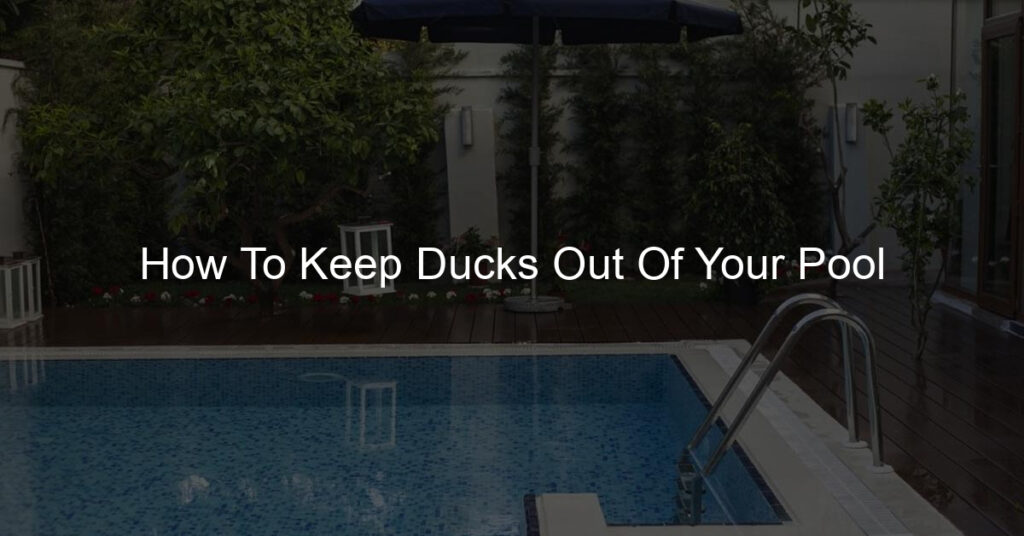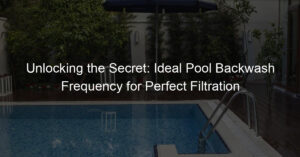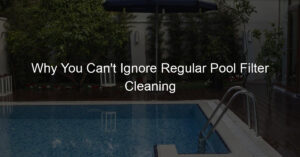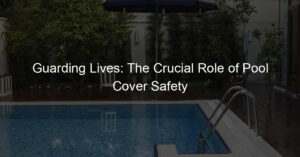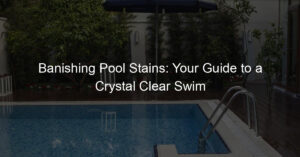Keeping ducks away from your swimming pool can feel like an uphill battle, but it doesn’t have to be. This comprehensive guide explores various tactics that homeowners can use to discourage these water-loving creatures from settling in your backyard oasis. By understanding why ducks are attracted to your pool, you can deploy effective solutions to keep them at bay.
Not only does this post offer solutions, but it also explains the potential problems caused by ducks in your pool and how to spot the signs of their unwelcome visit. You’ll find case studies, expert advice, practical tips, and product recommendations to help you in your quest. Keep reading to discover how you can maintain a duck-free pool without resorting to drastic measures.
Understanding Why Ducks Are Attracted to Your Pool
Ducks are naturally drawn to bodies of water – it’s a crucial part of their survival and lifestyle. Your swimming pool can be seen as an ideal spot for them, providing a safe haven to rest, feed and even nest. Factors such as the pool’s size, location, cleanliness, and lack of predators can make it highly appealing. Understanding this attraction is the first step towards implementing successful deterrent measures.
Identifying the Risks: The Problems Caused by Ducks in Swimming Pools
While ducks might seem harmless, they can cause various issues. Ducks are known carriers of diseases and their droppings can contaminate your pool with bacteria such as E.coli. Furthermore, they leave behind feathers and other debris, creating a significant maintenance problem. More than just an inconvenience, the presence of ducks can pose health risks for those using the pool.
Recognizing the Signs: How to Know If Ducks are Using Your Pool
Duck visits can be easy to identify. Look for signs such as floating feathers, droppings around the pool area, or frequent water disturbance. You may also notice regular duck visits at specific times of the day. If you’re noticing these signs, it’s time to take preventative action.
Duck Deterrent Methods: How to Keep Ducks Away From Your Pool
Several methods can deter ducks from frequenting your pool. These range from physical barriers like pool covers and netting to visual deterrents such as predator decoys or reflective objects. You might also consider sound deterrents that mimic the calls of predators. Combining multiple deterrents increases the effectiveness of your duck control strategy.
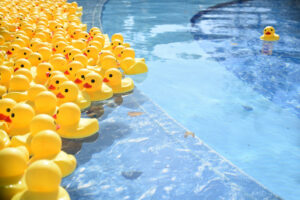
Chemical-Free Solutions for Keeping Ducks Out of Pools
There are plenty of non-chemical solutions to keep ducks away. These include pool covers, which not only keep ducks out but also help maintain pool temperature and cleanliness. Similarly, the use of ultrasonic devices can disturb ducks enough to keep them away without causing harm. Another solution is installing motion-activated sprinklers that scare off ducks when they approach the pool.
Duck-Proofing Your Pool: Barriers and Covers to Consider
Pool covers are an effective physical barrier that prevents ducks from accessing the pool. There are different types of pool covers, including mesh covers, automatic pool covers, and solar pool covers. Choose one that fits your pool’s shape and size. Pool fencing can also deter ducks by creating a physical obstacle they cannot cross.
How to Utilize Pool Scare Tactics: Decoys, Lights, and Sounds
Deploying scare tactics can deter ducks effectively. Predator decoys such as fake alligators or owls can frighten off ducks. Flashing lights or reflective objects can disorient and discourage them. Noise-making devices that emit predator sounds can also help. Remember to move these items regularly as ducks may become accustomed to stationary objects.
Using Natural Duck Repellents to Maintain a Duck-Free Pool
Planting certain vegetation around your pool can discourage ducks. Choose plants that ducks don’t like, such as those with prickly leaves or strong fragrances. Another natural repellent is a dog. Ducks perceive dogs as predators and tend to avoid areas where they are present. However, ensure that the dog is trained not to harm the ducks.
The Role of Landscaping in Deterring Ducks from Your Pool
Thoughtful landscaping can also help deter ducks. Ducks prefer areas with easy access to water. By creating a landscaped buffer of plants and rocks around your pool, you can make it less appealing to ducks. Additionally, you can landscape with plants that ducks find unattractive or difficult to navigate.

Essential Pool Maintenance Tips to Deter Duck Intrusion
Maintaining a clean and balanced pool is essential in deterring ducks. Regularly remove any feathers or droppings left by ducks, and make sure the pool water’s pH, chlorine, and other chemical levels are balanced. You can also use a pool skimmer to eliminate floating debris that attracts ducks.
How to Humanely Relocate Ducks That Have Settled in Your Pool
In some cases, ducks might decide to nest near your pool. In such scenarios, it is essential to handle the situation humanely. Contact a local wildlife control or animal rescue service that can help safely and legally relocate the ducks and their nest.
Leveraging Technology: Modern Gadgets to Prevent Ducks in Your Pool
Advances in technology have provided some innovative solutions to keep ducks away. Devices such as motion-activated sprinklers or ultrasonic pest repellers can effectively deter ducks. These gadgets detect the presence of ducks and emit deterrent stimuli, often without the need for manual intervention.
Case Study: Successful Methods of Keeping Ducks out of Residential Pools
Numerous homeowners have successfully kept ducks out of their pools by applying a combination of the methods discussed above. For instance, one case study showcased the effectiveness of using a physical barrier (a pool cover) in tandem with a visual deterrent (a predator decoy). Consistency was key in ensuring the ducks found a different habitat.
Professional Services: When to Call Wildlife Control for Duck Issues
If you’re dealing with persistent or aggressive ducks, or if the problem is beyond what you can handle, it might be time to call a professional. Wildlife control services understand how to handle these situations humanely and effectively, ensuring that the ducks are not harmed while solving your problem.
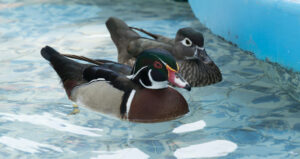
Frequently Asked Questions: Keeping Ducks Out of Your Pool
This section can address common queries about duck control, such as “Why are ducks attracted to my pool?” or “Is it legal to relocate ducks myself?” Providing straightforward answers to these questions can help readers gain a broader understanding of the issue and potential solutions.
Myths vs Facts: Effective Strategies to Keep Ducks Out of Your Pool
This section can debunk common myths about duck control and confirm effective strategies. For example, some people believe that feeding ducks will make them leave, but in reality, it encourages them to stay. Presenting facts vs. myths can guide homeowners towards more effective duck deterrent strategies.
Learning from the Experts: Advice from Pool Owners with Duck Problems
Advice from experienced pool owners can offer valuable insights. They can share their successful strategies, lessons learned, and recommendations for products or services. These firsthand experiences can provide useful guidance for readers tackling the duck issue.
Preparing for the Migratory Season: How to Make Your Pool Less Attractive to Ducks
Ducks are often most problematic during the migratory season. Making your pool unattractive before and during this season can prevent a lot of headaches. This can include measures like installing a pool cover, setting up decoys, or adjusting the landscaping around your pool.
The Impact of Local Laws and Regulations on Duck Control Methods
It’s important to note that local laws and regulations may dictate what you can and cannot do when it comes toduck control. Some areas protect certain species of ducks, making it illegal to harm or relocate them without proper permits. Always check with your local wildlife agency before taking any drastic measures.
Creating a Balance: Enjoying Wildlife without Letting Ducks in Your Pool
Ultimately, it’s about creating a balance between enjoying your local wildlife and maintaining your pool’s hygiene and usability. With thoughtful prevention strategies, you can keep ducks out of your pool without completely deterring them from your property. Remember, the goal is to coexist harmoniously with our feathered friends.
Comparison of Duck Deterrent Methods
| Method | Effectiveness | Cost | Ease of Installation | Environmentally Friendly |
|---|---|---|---|---|
| Pool Cover | High | Varies based on pool size and cover type | Medium | Yes |
| Decoy Predators | Medium | Low to Medium | Easy | Yes |
| Landscaping Changes | Medium | Varies based on design | Complex | Yes |
| Ultrasonic Devices | High | Medium to High | Easy | Yes |
In conclusion, while ducks can be a nuisance to pool owners, there are numerous strategies available to deter them. From understanding why your pool attracts ducks to various effective, humane, and often environmentally-friendly deterrent methods, this guide has provided you with a comprehensive approach to managing the issue.
Remember, the key is a consistent application and combining multiple strategies. Consult professionals if needed, and always ensure you’re adhering to local laws and regulations.
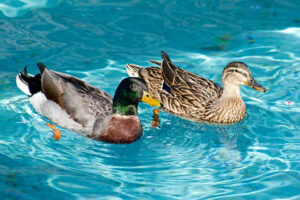
Digging Deeper: Aspects Beyond the Usual Considerations
While the above covers most aspects of keeping ducks out of your pool, there are other elements to consider as well. Here we delve deeper into some of these aspects.
Neighborhood Impact on Your Duck Problem
Often the problem isn’t just your pool but the neighborhood’s attractive elements for ducks. Factors like local ponds, feed sources, and the absence of natural predators can draw ducks to your area.
The Effect of Climate on Duck Behavior
Climate plays a role in duck migration patterns. Understanding this can help you prepare for potential duck visits. For example, milder winters may mean more ducks stay in your area instead of migrating south.
The Importance of Community Education
Informing your community about not feeding local ducks can contribute to reducing the attraction of your neighborhood to ducks. Collective action can have a larger impact than individual efforts.
The Link between Duck Problems and Pool Design
Your pool design can affect how attractive it is to ducks. Features such as steps or shallow ends can make your pool seem like a safe place for ducks. Consider this if you plan to renovate or build a pool.
Remember, every situation is unique. What works for one pool owner might not work for another. The most effective strategy will consider the specific circumstances of your pool, property, and local duck population.

